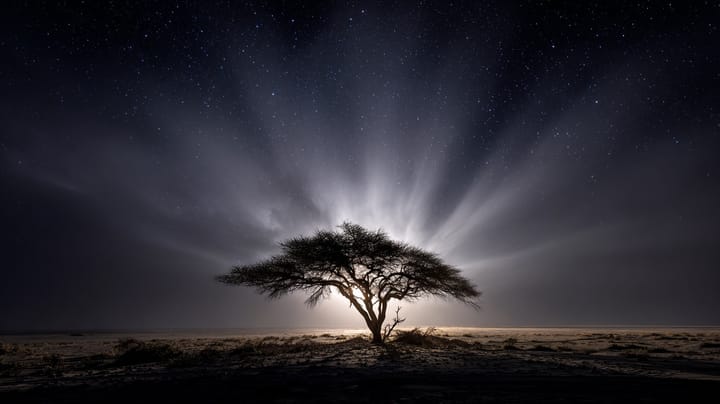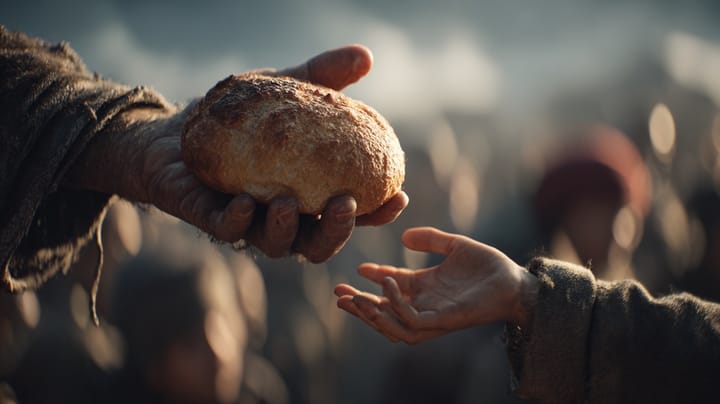Fairhaven Sermon 10-1-2023

Summary
Rev. Dylan Parson reflects on how we often want to go back to the past, even when the past was difficult or oppressive. Just as the Israelites complained to Moses about leaving Egypt for the uncertainty of the desert, Christians today can be tempted to pine for the “good old days” of the church rather than embracing where God is leading. Even when the present feels like a wilderness, God provides what the people need – water, manna, Jesus Christ himself – to sustain them on the journey. Though we don’t yet see the promised land, victory has been won through the suffering and death of Jesus. Our call is to adopt his attitude of humility and service as we carry out our discipleship with fear and trembling.
The core message is that even when the church’s situation seems bleak and uncertain, God has not abandoned us. If we trust in God’s provision and guidance, we will make it through this wilderness period. Christ’s victory gives us hope to press on, not look back. By walking in his footsteps of servanthood, we participate in the coming of God’s Kingdom.
Transcript
We’ve all encountered preachers, and who knows, maybe I am one, who preach pretty much a riff on the same one or two sermons over and over and over and over again their entire careers. Maybe I am one. You never really know. You don’t have that kind of self-awareness usually.
And I’m not sure if my mind has exaggerated it in the remembering, but my last year at at Duke Divinity, I swear I heard the new dean at the time, Greg Jones, preach pretty much the very same sermon three times. First in my evangelism class, he was a guest speaker. He always– his other position was professor of evangelism. Then in chapel, he preached the same thing.
And then at our baccalaureate graduation service, he preached the same thing. And whenever I heard him do that at what is arguably the richest, the most influential institution in the UMC. I have to say I rolled my eyes. I judged.
This man, for reference, Greg Jones, is a member of a United Methodist dynasty. We don’t have a lot of those. Probably two or three. He’s the brother of a bishop, who’s now the top leader in the global Methodist church.
He is a former university president and seminary professor, as well as, interestingly, a former dean of Duke. had come back at the time. This guy is one of the most dominating figures in the last two decades of the UMC. And somehow he couldn’t even come up with two unique sermons over the course of six months.
This is the best you could do. And you know what else? I have his book. We had to read his book for my Mission and Evangelism class. And I cracked it open this week to check on something else and you know what I found in there? The same story, the same sermon.
And as it happens, the scripture that I heard him preach on three times, four times if you count the book, was not exactly the one we read today but the book of Numbers telling of a similar moment to what we heard in Exodus. You know the Israelites spent a long time in the Sinai complaining and his sermon was on one of those moments. And so we see here in Exodus that the Israelites are trekking through the Sinai. They have been freed from slavery and Egypt in this miraculous intervention from God.
But now as the honeymoon period of emancipation has evaporated, they’re railing against God and against Moses for leading them out of their confinement, which was familiar, into a a scary and uncertain freedom. They want to go back. They’re getting thirsty and they want to go back. They want to go back through the Red Sea that God had split open to bust them out.
They want the miracle reversed. They want to go back to Pharaoh’s oppressive clutches. They’re hungry, they’re thirsty, they have no idea where they are. And all they can see all around them is just this ocean of rock and sand as far as the eye could see.
Egypt was terrible, yeah, but at least they knew it was coming every day. And the slave masters always kept them fed enough to keep them toiling every day. They might not have eaten well, but they were going to eat. They were going to get their water rations.
And so they say, don’t let us suffer and die out here if we’re not going to immediately make it to the promised land. This is not what we bargained for. us back to that misery on the Nile that’s at least familiar, we want to go back to Egypt. Don’t tell any of my seminary friends because I ripped on Greg Jones way too much, but I have to acknowledge that in hindsight I was wrong.
And the Dean was right to preach this message over and over again because I have come to believe that it is the story of Christ’s Church in our moment, at least in the Western world. I find this last verse of our reading from Exodus especially haunting. So Moses says they pass through that desert place, they move on from Horeb to the next place. As they leave it, he names it Massah and Meribah, which means arguing and testing.
Because there the Israelites argued with and tested the Lord, asking, Is the Lord really with us or not? Well, is he? Is the Lord really with us or not? Because we also live in very challenging times. We’re not in the desert dying of thirst, no, but we’re coming out of a pandemic where some seven million people have died. The news is dominated every day by images of the countless people in this country and in this city suffering from homelessness. Two generations of Americans now can’t afford houses that cost twice what they did ten years ago.
Swaths of New York were underwater this week as weather gets more and more extreme. The United Methodist Church’s American membership at last count in 2023 is about half of what it was at its founding in 1968. The population of the United States is twice what it was in 1968, but our population, our membership is half. And I don’t even know if that number is before or after 5,000 congregations left.
Is the Lord really with us or not? And I’m telling you I can see that sentiment crystal clear every time I go to annual conference. I hear it in conversation in the church, on the street, in the grocery store. I feel it in a spirit that can seem to rest over Western Pennsylvania sometime. We have kind of a thing about this.
And I know the sentiment can be there at church council meetings across the partnership from time to time, whether or not it’s said out loud, Is this really worth it? Is the Lord really with us or not? Wherever God is sending us right now, wherever we’re being led, we don’t really want to go. We want to go back to Egypt. If the promised land is somewhere over the desert horizon, we’d just as soon turn around, thanks, because this is painful. There’s pain on the way to the promised land.
Why would God bring us this far just to suffer? Dean Jones joked about it using a phrase that I’ve heard other preachers reference here and there. I think he said he got it from his preacher dad. Every church, every denomination, every group of Christians has an unofficial back to Egypt committee whose sole mission is to get things back to the way that they were, which is of course impossible. You know, you can’t walk the same point in a river twice.
There were problems in the past, yes, we remember if we really think back. But you know, at least the pews were full. We understood our situation. And looking back, it was pretty okay in hindsight.
There might have been some rough stuff here and there, but it was pretty okay. Back then, things weren’t perfect, but we knew we’d wake up tomorrow in a familiar situation, just like when the Israelites knew that they were going to get food and drink. The Israelites, as Moses guides them through the badlands of the Sinai, feel all of this deep in their bones as a hopeless rage starts to build. And Moses knows it.
Moses is getting a little skittish and so he goes to God to plead for help knowing that he’s in way over his head. This was never what he intended to do and he’s actually fearing for his life if he can’t cool the people down. He says to God, These people, my congregation, my nation that you’ve charged me to lead, They’re about to stone me because they’re so thirsty, they’re so mad to be out here. Please help me.
Tell me what to do with these people. Please give me a way forward. And God responds with a solution. God tells Moses to take his staff, the same staff that he turned the Nile to blood with, and he says to smack a rock, and cool, fresh drinking water would pour out of it to quench the people’s thirst.
God said he’d be standing on that rock and whenever Moses struck it a stream would emerge. Now notice that God’s solving the immediate problem, the people are thirsty, right? But notice there are two things that God doesn’t do. First, he doesn’t give them permission to return to Egypt. That’s not in the cards, that’s just not happening.
God has way bigger plans for his people than to allow them to check back into servitude and obscurity to run the other direction as soon as they run into hardship. God has saved this people, God has called this people for a reason, that they might become a great and holy nation. He has blessed them that through them all the nations of the earth might be blessed, might be drawn back towards God, might be saved and redeemed. But the second thing that’s not going to happen.
God is also not just going to take them straight to the promised land. In fact, they have about 39 more years. So they can say, Are we there yet? all they want. They can grumble all they want, aching with the discomfort of the wilderness, but they’re going to be in the desert a while.
They’re going to be humbled by it. They’re going to be purified by it. That’s a part of the plan that God makes very clear here is not going to be bypassed. As much as they’d like to bypass it, as much as they’d like to get there, the Sinai is not that wide.
And as much as we’d like to avoid wilderness times, it’s not going to be bypassed. But in the meantime, God says He is with them. He proves that He’s with them. He ensures they have the basic needs to get through their day.
Even if their situation is unfamiliar to what they’ve known, even if they’re not yet in the land of milk and honey, at least they’ve got some water. Soon they’ll get manna and quail. They complain about that too. But they have what they need to survive.
And so if we’re in the wilderness, and I believe the church is, not just this church, but the church, this is the promise that we receive today. God is with us. God ensures no matter how lost and anxious and uncertain we are that he’ll crack open rock to make sure we have streams of flowing water to keep us well on the journey. God will ensure that we are adequately nourished for what lies ahead whether we believe that or not.
Paul’s letter to the Philippians adds an extra layer to this too because Paul says not only is God providing the nourishment we need, Paul tells us that Christ has given himself as the the nourishment we need to survive. He poured himself out taking the form of a slave that is not just a human being but a human being of the lowest position. He humbled himself submitting willingly to death on a cross so that through his weakness God gave him and his people victory. So God is not just guiding us through the journey in the wilderness.
God walks alongside us through deepest fear, through despair, as one of us, with us, alongside us. Jesus Christ walked in to hell and back for us. And because of what he has done and what he does, there is victory in weakness. The cross doesn’t look like it should be a victory, but it is.
Christ’s victory and ours. And we might not recognize it, but even in our hardest moment Jesus is working towards victory in and through us as we carry out our own salvation with fear and trembling. The Apostles description of a life of discipleship. John Wesley loved that phrase, carrying out our discipleship with fear and trembling.
So much like the promised land of Canaan for the Israelites stuck in the Sinai, it can feel really impossible to imagine our promised land, that we’re on the way there, that the victory of God’s reign is just beyond the horizon. That’s not really what it looks like on a day-to-day basis. But it is. Paul proclaims that everybody in heaven, on earth, and under the earth will bow and every tongue confess that Jesus Christ is Lord.
How can that be whenever we’ve got what, 1-2% of people in this town and church on a Sunday morning, but every tongue’s going to confess every knee bow? And you would think that the larger context of this verse might be a passage from Revelation. You know, you hear about confession and and bowing and you might picture Jesus standing with a sword in battle, but that’s not the context here at all. The victory, total and eternal, will come about because Jesus has poured himself out in suffering and shame for people like us, people who are so ungrateful as to complain about being freed from slavery, people so ungrateful as to nail their Savior to a cross. And we, Paul says, in order to partake in that victory, are to adopt that same attitude that was in Christ Jesus, that same position of humility beyond all measure, of foolish humility.
And these are two really startling images to hold together, I think. On one hand, you’ve got the people complaining in the wilderness, weary of the freedom that God gave them. They don’t even want their freedom anymore. And on the other hand, we have this image of a Lord of all creation that causes water to pour from a stone.
That same Lord from whom water would pour from his side as he’s on the cross. Is the Lord really with us or not? Ask the Israelites as they wander in the desert. Is the Lord really with us or not? We ask in our season of wandering, of uncertainty. Moses points towards a stream gushing from a parched stone and says, Yes.
Paul, pointing to a Savior crucified and risen, says, You have no idea. In the name of the Father, and the Son, and the Holy Spirit, amen.


